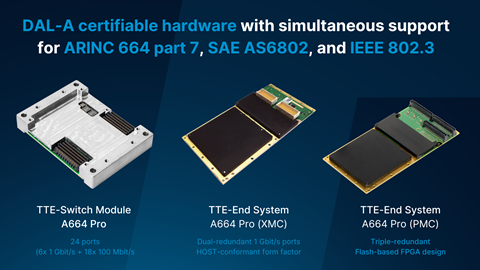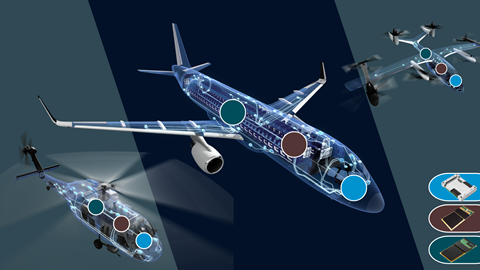The aviation market today is evolving towards greater levels of autonomy and automation, supported by technological advancements that are enabling this transition. This transformative shift is reflected mainly in the emerging Advanced Air Mobility (AAM) sector, but also in the traditional commercial aviation market in the effort to increase sustainability and to optimize aircraft operation. As new applications need to be implemented at a fast pace, open and modular certifiable high-performance platforms are required to support the needs of the current and future aviation market.
A deep understanding of the traditional aviation market’s needs and technical expertise in the development and design of safe and secure networking solutions is at the core of TTTech’s aerospace business. TTTech has served various market sectors in the transportation industry (automotive, railway, aviation and space) for more than 25 years, providing components, products, hardware and software platform solutions for the design, testing, setup, and operation of reliable and safe and secure on-board networked electronics systems and in particular avionics and control systems from small to large aircraft to even space applications.
“From our very beginnings 25 years ago, TTTech’s technologies and solutions were based on the synergies that we saw in the transportation industries in particular: aerospace, automotive and railway. There was the need for high-performance, open standards-based deterministic and composable network solutions – with aerospace requiring the most stringent safety standards and the high volumes in automotive driving the semiconductor industries. For the last couple of years, and in particular boosted by COVID, more automation to autonomy has been a key market driver in the transportation industry. The ever-increasing innovation in software and hardware platforms as well as applications including AI require very sound and reliable, safe and secure system architectures – for which deterministic, composable networks are a key building block,” says Kurt Doppelbauer, Vice President Sales & Business Development at TTTech Aerospace.

Building future-proof platforms
In aviation, safety and security requirements are stringent, thus clearing certification and regulatory approvals in a timely fashion is critical for bringing new applications to the market. This is particularly true for the AAM sector, where air taxis for passenger transport and advanced delivery drones and cargo transport vehicles are expected to fly (semi-)autonomously in the same airspace and must be integrated into air traffic control operations. As with autonomous driving on the ground, these airborne vehicles will need to follow a sensible approach to the market, to allow legislation to develop alongside, but also gain acceptance by end users. Being able to leverage previously certified avionics components into such new platforms allows innovative companies to focus on breakthrough technologies that are driving the new industry segments (eg battery performance, eVTOL aerodynamics, and autonomy).
Another relevant aspect is that modern cockpits are increasingly data-driven and more connected – this ranges from solutions that optimize flight paths and routes to save fuel and operating cost, to dynamic targeted information, for example, on flight routes, air traffic, or weather updates on modern screens for pilots, to condition-based prognostic solutions supporting smart maintenance of the aircraft.
These new requirements for avionics also demand a different approach to system development, with a move from federated systems with dedicated functionality towards a modular, composable, and partitioned and at the same time more software-defined zonal platform approach, which is already a reality in the automotive industry. This type of approach makes it easier to add more functionalities to existing systems. Another key factor is the data transmission between distributed computers, sensors, and actuators. Deterministic Ethernet has emerged as the standard technology for high-speed communication in data networks, but it needs an additional dimension of fault-tolerance, safety mechanisms, and reliability to meet aerospace standards. That is why Deterministic Ethernet networking solutions are chosen for modern aviation applications like ARINC 664 part 7 or SAE AS6802 (Time-Triggered Ethernet): they enable safe, reliable transmission of safety-critical data, fulfill open international standards, and thus enable interoperability between (sub-)systems from different suppliers.
Deep expertise in safe connectivity solutions and deterministic networking
Doppelbauer points out that customers may have different needs for their programs, but one common factor is the use of open standard Deterministic Ethernet-based networks: “All major aerospace manufacturers as well as startups in the AAM sector are gravitating towards open standard Ethernet-based deterministic, DAL-A (the highest design assurance level) certifiable network solutions. The data network is the nervous system of an aircraft and needs to last for twenty to thirty years, or even longer. State-of-the-art high-performance level A certifiable network platforms enable manufacturers to develop faster, to integrate more easily, to test and verify and certify quicker. They facilitate simplified systems upgrades and technology updates, while ensuring reliable transmission of critical and non-critical data. Finally, aircraft manufacturers can more easily build distributed, integrated modular avionics.”

TTTech Aerospace’s deterministic networking products and solutions are ideally suited for high-availability, safety-critical systems and allow the combination of previously separate systems into a single unified architecture that combines different traffic classes and data transmission priorities.
Decades of cross-industry technology expertise enables TTTech Aerospace to provide data networking solutions for onboard systems, including the most safety-critical systems like flight controls, power distribution, landing gear, and engine control systems. The portfolio includes components (ASICs, modules, and boxes), technology, network solutions, as well as embedded software, and qualified verification and validation tools to cover customer needs throughout the whole product lifecycle.
As certification is a key requirement in aviation, TTTech Aerospace provides products certifiable according to RTCA DO-178C DAL A (software) and RTCA DO-254 DAL A (chip IP, firmware, and hardware) that can support the certification of platforms according to DO-297. Certification is in accordance with the standards set by the European Union Aviation Safety Agency (EASA), the Canadian Council for Aviation and Aerospace (CCAA), and the USA’s Federal Aviation Administration (FAA). TTTech’s design principles are guided by the system certification standard ARP4754A, a recommended guideline from SAE International for developing civil aircraft and systems that supports the certification of aircraft systems, in its development processes.

Finding the best solution for each application
Alvaro Soares, Director of Aviation Products & Customer Programs at TTTech Aerospace, says safety and security are of utmost importance, but it is unlikely that a singular solution will meet all markets’ needs for implementing reliable data networks: “There are different schools of thought and trends within different market segments. Commercial air transport OEMs have championed the use of ARINC A664 part 7 for avionics and are looking to build upon that foundation by adding capability and performance to those systems. Many of those features can be found in TTEthernet systems, such as support for standard IEEE 802.3 Ethernet, higher bandwidth, time awareness / synchronization, and multiple traffic class support. Alternatively, technologies such as Time-Sensitive Networking (TSN) are also gaining traction in the American defense sector due to its prevalence in industrial and automotive markets. The beauty of working with TTTech Aerospace is that we have industry-leading solutions that can satisfy and exceed requirements in this broad spectrum. Our focus is not only in delivering products that meet the current digital backbone needs but also in shaping the new standards that will make up aircraft networks for decades to come.”

TTTech is an innovator in the field of Deterministic Ethernet and a driving force behind the IEEE 802.1 TSN and the SAE AS6802 Time-Triggered Ethernet standards. Its cross-industry technical expertise and development know-how is applied to build reliable and efficient avionics systems based on various standards like Time-Triggered Ethernet, ARINC A664 part 7, Time-Sensitive Networking (TSN), and Time-Triggered Protocol (TTP®).
ARINC 664 part 7, AFDX® and TTEthernet®
ARINC 664 part 7 is an Ethernet-based deterministic communication standard widely used in modern aircraft to reduce wiring and improve reliability in the data network. Airbus has trademarked an implementation of this open standard as Avionics Full-Duplex (AFDX®). ARINC 664 part 7 is a deterministic solution that can reach speeds of 100 Mbit/s, asynchronously.
Building on the legacy of ARINC 664 part 7, TTEthernet offers a solution that reaches 1 Gbit/s while introducing a synchronous traffic class (according to SAE standard AS6802) and a best-effort traffic class (according to IEEE 802.3). These different traffic classes can be used simultaneously and scheduled in a single tool landscape. By enabling a high bandwidth digital backbone with multiple traffic class priorities, TTEthernet is well suited for a range of critical systems, while still meeting the bandwidth trends put forth by the civil, defense, and air mobility industries.
With its TTEthernet portfolio, TTTech Aerospace allows integrators to scale networks based on ARINC 664 part 7 into mixed-criticality networks – eg a video stream running on standard Ethernet and safety-critical control data transmitted according to the Time-Triggered Ethernet standard or per ARINC 664 part 7. An example of where a TTEthernet network is used to enable new capability is its role in Honeywell’s Anthem™ platform, Honeywell’s next-generation, integrated flight deck, which is scalable for a broad range of aircraft types and sizes, from passenger planes and business aircraft to defense, general aviation, and advanced air-mobility (AAM) vehicles. TTEthernet end systems and switches are used as the avionics backbone that connects all functions in the flight deck, and enable Honeywell to build safe, reliable, high-performance avionics and control platforms, while also reducing space, weight, power, and cost.
Time-Sensitive Networking (TSN)
Born out of an effort to increase time-awareness and determinism in industrial Ethernet systems, Time-Sensitive Networking has become a suitable contender for modular open systems that have high flexibility requirements and varying certification needs. TTTech is an early contributor to the IEEE 802.1 TSN standard and has deployed its TSN products in the automotive, industrial, and aerospace sectors.
As was the case with TTEthernet, TSN also allows multiple traffic classes to be used concurrently on the same wire, by making use of independent extensions defined under different traffic shaping and policing standards. TTTech’s TSN products have also been demonstrated to reach line bandwidth rates as high as 10 Gbit/s.
An aerospace profile (IEEE 802.1DP) is being developed to satisfy the needs of a high-criticality airborne network. In the defense arena, TSN is becoming more widely adopted, but as a technology that has been developed more recently, TSN is still building its certification pedigree and has yet to be fielded in any high development assurance scenario.
Time-Triggered Protocol (TTP®)
Time-Triggered Protocol (TTP) has been deployed extensively in highly critical systems (e.g. flight controls, engine controls, and power distribution systems). Although not an Ethernet-based solution, it is very well suited for safety-critical systems that are highly SWaP-sensitive and prefer a bus architecture, instead of a switched network. It offers fault-tolerant low latency synchronous communication and ensures data integrity and system robustness in systems where reliability is a higher priority than ultra-high bandwidth rates.
One of the products in TTTech Aerospace’s portfolio is the TTP-Controller, which has accumulated over two billion flight hours with zero safety-critical defects in aircraft models like Embraer Legacy/Praetor 450/500, Embraer E2 family, Bombardier Global 7500y, the Airbus A220, and the Airbus A380.
Going beyond a traditional supplier: a reliable partner with deep technology know-how
With a range of different options and an ever-changing landscape, integrators may find it challenging to arrive at an optimal yet scalable solution. TTTech Aerospace’s decades of close collaboration with aviation industry leaders on civil and defense programs make it a reliable partner: “Selecting the appropriate solution for a given vehicle goes beyond just cost and protocols – a partner with the pedigree of safety-critical applications, along with the expertise to define deterministic architectures, is essential to success in developing a robust digital backbone. TTTech has a range of proven, certifiable components and products that suit an array of applications, along with a deep training and consulting catalog for the design and integration of data networks. With our portfolio of certifiable solutions, customers can cover the entire lifecycle, from development to testing, flight, and sustainment. We welcome customers to approach us as a networking architecture partner and invite them to discuss their unique needs and constraints, so we can find the best solution for them,” says Soares.
























